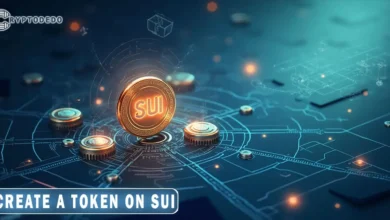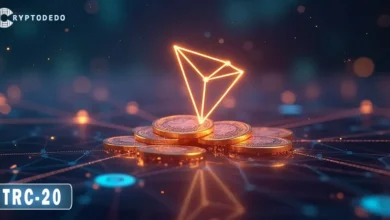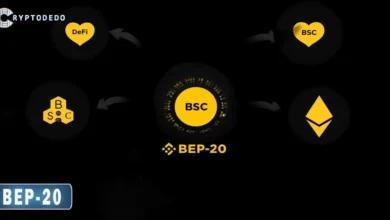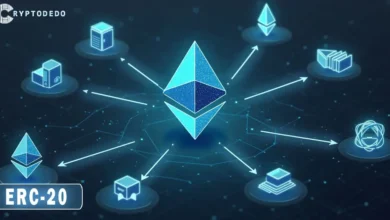Governance Tokens Explained: The Future of Decentralization
Why Governance Tokens Matter for Decentralized Finance

What Are Governance Tokens?
Governance tokens are special types of cryptocurrency tokens that give their holders a voice in how a project or decentralized platform is managed. Imagine being part of a community that runs a project without a CEO or central authority. Instead, everyone who holds these tokens can vote on important decisions. It’s like owning shares in a company, but in this case, you’re helping to decide the future of a decentralized platform.
Let’s break this down with a simple example:
Example: Deciding What to Add to a Crypto Game
Imagine you’re part of a crypto gaming community, and the game is managed by a decentralized platform. The platform releases governance tokens, which are given to the players. If you hold some of these tokens, you can help decide what new features or rules are added to the game.
Maybe the community is voting on adding a new character or changing how rewards are given out. By holding the tokens, your vote helps decide the outcome!
How Do Governance Tokens Work?
When you hold governance tokens, you get to vote on proposals related to the project. These proposals can be about technical upgrades, how funds should be used, or even who should be part of a partnership. Usually, the more governance tokens you have, the more powerful your vote becomes.
For instance:
Example: Upgrading a Blockchain Imagine there’s a blockchain project that wants to upgrade its software to make it faster. The developers put forward a proposal to the community explaining the changes they want to make.
If you hold governance tokens, you can vote on whether you agree with the upgrade. If most token holders vote “yes,” the project moves forward with the update. If the majority votes “no,” the developers may need to rethink the proposal.
Why Are Governance Tokens Important?
Governance tokens are essential because they allow decentralized platforms to stay true to the principles of fairness and transparency. In a traditional company, decisions are often made by a small group of executives. But with governance tokens, the power is shared among the community.
Think of it this way:
Example: Voting on Fees in a DeFi Project Let’s say there’s a decentralized finance (DeFi) platform where people can lend and borrow cryptocurrency. The platform wants to change its fee structure, which would impact how much lenders and borrowers pay.
Instead of one person deciding this, governance token holders can vote on whether the fee change should happen. If you’re a token holder, your vote helps shape how the platform operates, ensuring the community’s voice is heard.
Detailed Examples of Governance Tokens
Here are some examples of popular governance tokens and how they work in real-world projects:
Uniswap (UNI)
Uniswap is a decentralized exchange (DEX) that allows users to trade cryptocurrencies directly with each other without a central authority. UNI is its governance token. Holders of UNI can vote on decisions such as whether to introduce new features, change how liquidity pools work, or even adjust the fees charged on the platform.
Example: If Uniswap’s team proposes lowering transaction fees to attract more users, the decision isn’t made by the developers alone. Instead, all UNI holders get to vote. If most people agree, the fees are lowered.
Maker (MKR)
MakerDAO is a project that manages the creation of a stablecoin called DAI, which is tied to the value of the U.S. dollar. MKR token holders vote on risk management decisions, such as how much collateral (backing) is required to mint new DAI tokens.
Example: Imagine there’s a proposal to reduce the amount of Ethereum needed as collateral to create DAI. MKR holders vote on whether this should happen. If the majority approves, the change is made, directly impacting how new DAI tokens are created.
Compound (COMP)
Compound is a DeFi platform that allows users to lend and borrow cryptocurrencies. COMP is the governance token, and holders vote on changes to things like interest rates or even which cryptocurrencies can be added for lending and borrowing.
Example: Suppose the platform is considering adding a new cryptocurrency, like Solana (SOL), for lending and borrowing. Instead of one person making the decision, COMP holders vote. If the majority approves, SOL is added to the platform.
Aave (AAVE)
Aave is a decentralized lending platform that allows users to lend and borrow a wide range of cryptocurrencies. AAVE is the governance token of the platform, and holders can vote on decisions that affect the protocol, such as adjusting interest rate models, adding new lending markets, or managing reserves.
Example: Suppose Aave wants to introduce a new feature that allows users to stake their AAVE tokens for additional rewards. The decision to implement this feature isn’t solely made by the developers. Instead, AAVE token holders vote on the proposal. If most token holders agree, the feature is added, directly benefiting the community.
SushiSwap (SUSHI)
SushiSwap is another decentralized exchange (DEX) similar to Uniswap, but with some unique features, like offering rewards to liquidity providers through the SUSHI token. SUSHI token holders participate in the governance of the platform, voting on fee distribution models, token listings, and other operational matters.
Example: Suppose SushiSwap proposes a change in how fees are distributed to liquidity providers. Currently, 0.05% of every transaction goes to SUSHI stakers. If the proposal suggests increasing this to 0.10% to attract more liquidity, the decision will be put to a vote among SUSHI holders. If the community agrees, the change is implemented.
Yearn Finance (YFI)
Yearn Finance is a DeFi platform that helps users maximize returns on their cryptocurrency investments by automatically moving funds between lending platforms. YFI is the governance token of the project, and YFI holders can vote on strategies that affect how the platform generates yield, as well as broader protocol changes.
Example: If Yearn Finance wants to change its strategy for investing in stablecoins, YFI token holders would vote on the best strategy. This could include switching to a different protocol to get better interest rates or adjusting risk parameters. The decision lies with the YFI holders, ensuring that the community drives the platform’s growth.
Curve (CRV)
Curve Finance is a decentralized exchange optimized for stablecoin trading. Its governance token, CRV, is used to vote on decisions like liquidity pool rewards, fee structures, and changes to the protocol’s future direction. CRV holders also help decide which pools receive additional CRV rewards, incentivizing liquidity in specific pools.
Example: Imagine Curve wants to incentivize a new pool that trades between two stablecoins. CRV token holders vote on how much additional CRV should be rewarded to liquidity providers of that pool. If the community agrees, more rewards are allocated, attracting more liquidity to that pool.
PancakeSwap (CAKE)
PancakeSwap is a DEX built on Binance Smart Chain, offering low fees and fast transactions. CAKE is its governance token, and CAKE holders vote on a variety of platform-related decisions, such as adding new farming pools, changing CAKE token emissions, and adjusting platform fees.
Example: Let’s say the PancakeSwap team wants to add a new farming pool where users can earn CAKE by providing liquidity to a newly listed token. CAKE holders would vote on whether this pool should be added and how many rewards should be distributed to participants.
Balancer (BAL)
Balancer is an automated portfolio manager and decentralized exchange. BAL is its governance token, and holders can vote on protocol upgrades, new token listings, fee structures, and liquidity mining incentives.
Example: Suppose Balancer is considering introducing a new fee tier for large traders to attract more high-volume transactions. BAL token holders would vote on whether this new fee structure is a good idea. If most holders agree, the new fee structure would be implemented, helping the platform grow.
Dash (DASH)
Dash is a cryptocurrency with a strong focus on fast, low-cost transactions. It also has a decentralized governance system, where DASH token holders (particularly masternodes) can vote on how the project’s treasury is spent. This could include development, marketing, or other community initiatives.
Example: If a developer team proposes a new upgrade for the Dash network that enhances transaction speed, DASH masternodes vote on whether to allocate funds to support this upgrade. If the majority agrees, the upgrade is funded and implemented.
Are Governance Tokens a Good Investment?
Governance tokens offer a unique blend of utility and investment potential. Not only do they give holders the power to influence the direction of a decentralized project, but they can also be traded on cryptocurrency exchanges like other tokens. However, it’s crucial to understand that governance tokens are primarily designed to give you a voice in the project’s development, with the added benefit of possible financial returns.
Voting Power vs. Financial Gain
The main purpose of governance tokens is to empower users to participate in the decision-making process of a decentralized project. By holding these tokens, you become part of the community that determines how the platform evolves. This can range from voting on technical upgrades to choosing how the project allocates its funds.
However, these tokens can also hold financial value, and their price may increase as the project gains popularity or succeeds in achieving its goals. The dual nature of governance tokens means that they are both an asset for influencing the project’s future and a potential investment vehicle.
Example: Let’s take Uniswap’s UNI token as an example. When Uniswap introduced its governance token, the value of UNI rose significantly because of the platform’s popularity. Early adopters not only gained voting rights but also benefited from the token’s appreciation in price, creating a financial reward for those who believed in the project’s long-term vision.
Factors Affecting the Value of Governance Tokens
The value of a governance token depends on several factors, including the success of the underlying project, market demand, and the utility the token provides within the ecosystem. Here’s a breakdown of the main factors:
Project Success:
If the decentralized project or platform is successful, attracting more users and building valuable partnerships, the demand for governance tokens typically increases. As more people want to be part of the decision-making process, the value of the tokens may rise.
Example: If a DeFi platform like Aave gains more users and liquidity, more people might want AAVE tokens to have a say in how the platform operates, driving up the token’s price.
Utility and Influence: Governance tokens that offer significant influence over key decisions are often more valuable. If the token gives holders the power to make impactful decisions—such as changes to fees, partnerships, or new product launches—it can attract more interest.
Example: MakerDAO’s MKR token is highly valued because MKR holders can vote on crucial decisions like adjusting the collateral requirements for creating the stablecoin DAI. These decisions affect the stability of the entire MakerDAO ecosystem, giving MKR significant weight in governance.
Market Speculation: Like any cryptocurrency, governance tokens are also subject to market speculation. Traders and investors might buy tokens hoping their price will rise in the future, which can create volatility. However, this speculative aspect shouldn’t be confused with the token’s primary purpose: governance.
Example: Even though governance tokens are meant for participation, many traders buy tokens like UNI or COMP simply because they expect the token’s price to increase over time, which can sometimes lead to short-term price spikes.
Risks of Investing in Governance Tokens
While governance tokens can be lucrative, there are risks involved:
Volatility: The price of governance tokens can be highly volatile. Since their value is often tied to the success of a specific project, if that project faces challenges or fails to meet expectations, the value of its governance token can plummet.
Example: If a DeFi platform faces a security breach or loses user trust, the value of its governance token may drop rapidly, as users no longer see the project as viable.
Limited Financial Utility: Unlike some cryptocurrencies that are used for transactions or earning interest, governance tokens primarily serve a voting function. This means that while you can trade them, their primary utility is in decision-making, which might not appeal to all investors looking for a quick financial return.
Example: If you hold a governance token like CRV (from Curve Finance), the token’s main value comes from voting on platform governance, not necessarily from its price appreciation. If the governance process is not active or impactful, the token’s utility may feel limited.
Centralization of Power: In some cases, governance can become centralized if a few large holders (called “whales”) control most of the tokens. This can undermine the idea of decentralized decision-making and reduce the influence of smaller token holders. If a few big players dominate the voting process, the project might not evolve in the way the wider community wants.
Example: If a small group of investors holds most of the COMP tokens in the Compound platform, they may dominate important votes, leaving smaller holders with less influence.
Long-Term Potential of Governance Tokens
For those who are genuinely interested in shaping the future of a decentralized project, governance tokens offer a unique opportunity. If you believe in the project and its mission, holding governance tokens can provide both financial rewards and a chance to actively participate in important decisions.
Governance tokens are especially appealing in projects that emphasize community-driven development and decentralization, such as in DeFi, NFTs, and metaverse platforms. As more people become interested in decentralized governance, the long-term demand for these tokens may grow, potentially leading to greater value.
Example: As more people become interested in decentralized finance (DeFi), the demand for governance tokens like UNI, MKR, and COMP could increase, not only because of their monetary value but also due to the influence they grant holders in shaping the future of decentralized financial systems.
Example: UNI Token’s Price Growth Uniswap’s UNI token didn’t just give holders voting rights; its price also increased as Uniswap’s popularity grew. This means that early UNI holders not only had a say in how Uniswap evolved but also saw their tokens rise in value. However, as with any investment, prices can go down too, so it’s essential to consider both risks and rewards.
Conclusion
Governance tokens are a key element in decentralized projects, allowing community members to actively participate in decision-making. Whether it’s voting on technical upgrades, fee changes, or new features, governance tokens give you the power to shape the project’s future.
By holding these tokens, you’re not just a passive investor; you’re playing an active role in how the project develops. And as blockchain technology and DeFi platforms continue to grow, governance tokens are likely to become even more important in ensuring that projects stay true to their communities.
With this understanding, you’re now ready to explore the world of governance tokens with confidence, knowing that your decisions can have a real impact.




